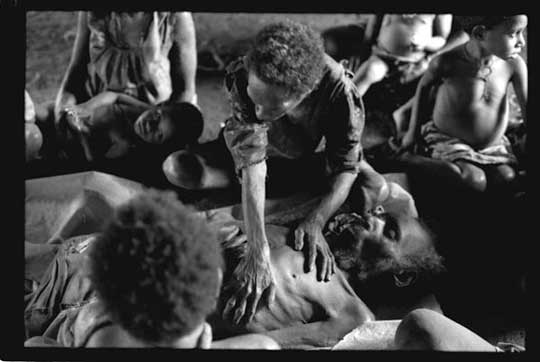Papua New Guinea
|
|

Edia's Graf
In juli 1988 stierf Edia. Hij was de oudste bewoner van Gofabi, een klein dorp op het Western Plateau in Papua New Guinea. Vroeger legden deze Bedamuni hun doden op een platform achter het langhuis, zodat vogels en insecten het vlees van het lichaam konden opeten. Familieleden uit andere dorpen hadden de tijd om naar het dorp te komen en afscheid te nemen van de dode. Vrouwen zaten dagenlang onder het platform en wreven zich in met het lijkvocht van de overledene.
De overheid wilde deze praktijk tegengaan door de dorpshoofden ervan te overtuigen dat zij hun doden voortaan beter konden begraven. De Bedamuni hebben hier moeite mee. Zij willen hun doden liever zo lang mogelijk bij zich houden.
Drie dagen na Edia's dood en na een vier uur durende nachtelijke rede van het dorpshoofd, besloten de mannen een kuil te graven. Op de vijfde dag legde zij hem in het graf. Zijn vrouw hield hem daar zo lang mogelijk gezelschap, terwijl zijn familieleden om de kuil heen zaten en wat van zijn bezittingen erin lieten vallen.
Op de zesde dag sloten zij het graf.
|
|
Edia's Grave
In july 1988 Edia died. He was the oldest inhabitant of Gofabi, a small village on the Western Plateau of Papua New Guinea. Traditionally the Bedamuni would lay a corpse on the platform at the back of the longhouse, so that birds and insects could eat the flesh. Family from other villages had the opportunity to come to the village and say farewell. Women were sitting under the platform for days and rubbed themselves with the liquid dripping out of the body.
The government wanted to end this practise by convincing the head of the village that it is better to bury dead bodies. The Bedamuni find this rather difficult. They prefer to keep the deceased with them as long as possible.
Three days after he died and after a four hour oration during the night by the village chief, the men started digging a grave. On the fifth day Edia was laid in the grave. His wife stayed with him as long as possible while the rest of the family was sitting around the pit, throwing some of his possessions into it.
On the sixth day they finally closed the grave.
|
|